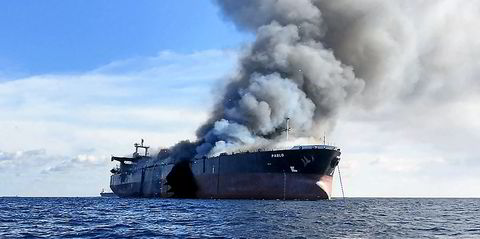The global ship finance sector has had a rough few years and Singapore has not been spared, but some segments have fared better than others.
And major banks that have been active in providing finance for traditional shipping are keeping their flags planted firmly in the Lion City.
“The recent weakness in the offshore oil market has affected banks who are deeply involved in financing the relevant offshore companies,” says Woon Aw Yong, senior vice president for HSH Nordbank in Singapore.
“However, we see that traditional ship finance banks, like ourselves, remain committed to the shipping industry.”
He says even industry stalwarts such as HSH Nordbank have had to adjust to the new realities of the ship finance sector.
“For us, we have shifted to an approach that places more emphasis on the background and quality of our borrowers,” he says.
“Our clients must be able to convince us that they possess the capability and correct strategy to manage their business [and] investments in the long run as shipping is still a long-term business.”

Woon also points to the emergence of Chinese leasing companies in shipping, which have been gaining popularity in recent years and are said to be exploring setting up offices in Singapore.
“This provides another option for shipowners to gain access to funds,” he tells TradeWinds.
“This is, in general, positive for the ship finance market in Singapore, but there could be increased overcapacity issues for the shipping industry if these leasing deals are used to fund speculative projects.”
He adds that Chinese leasing companies have also created increased competition especially towards the bigger corporate clients, as they were able to place big newbuilding orders due to the availability of funding and very low prices.
Added risk
Rob Heijliger, regional head Asia, shipping, at ING Bank, is also concerned about the risk that the easy access to alternative forms of financing could have on already fragile shipping markets.
“It only takes a few series of new ships to tip the balance,” he says.
Heijliger says ING has always maintained a cautious approach to ship financing, "a successful strategy that has served us well since the 1990s".
But it remains open for business with shipping clients.
“We have never closed," he says. "Our focus is to finance companies, not individual assets, providing secured corporate finance against balance sheets. Our target clientele are top-tier, corporate-style shipowners.
“We partner with companies that have reputation, financial performance and strength, quality management with a good strategy and, very importantly, access to cargo through peaks and troughs.
"The only time we have encountered problems has been when we have deviated from this strategy, although this has been quite minimal.”
However, Heijliger admits the bank has recently had to say goodbye to a few smaller clients who were no longer deemed to be a good fit.
While he does not disclose the identity of ING’s shipowning clients, Heijliger indicates the majority have strong links to the commodities sector.
He claims ING in Singapore was not affected by the collapse of the offshore market as it was not involved in the sector.
“Globally, ING’s involvement with ship finance has been very cautious and conservative. Our global shipping book, at $10bn, is just a small fraction of the ING balance sheet," he says. "We are very aware that if we underperform or rack-up huge losses, we would lose the interest of the senior management.”
Nicolas Parrot, head of transportation sector investment banking for BNP Paribas in Asia-Pacific, says a lot has changed when it comes to the ship finance market in the region.
“There have been a lot of exits and a lot of new entrants,” he tells TradeWinds. “While a number of European banks have exited completely, a number of Asian banks have entered the market.
“Today, we have some Australian banks which are relatively new to this market, who are entering.”
In particular, National Australia Bank and Commonwealth Bank of Australia are new players in the sector.
Meanwhile, TradeWinds has previously reported that Australian bank Macquarie has added personnel to its operations in Singapore to boost its Asian business.
Parrot also has high praise for the local Singapore banks, which he says have “been very aggressive” in the shipping sector, despite being impacted on the offshore market.
“Today honestly, we don’t see a lack of financing," he says. "We see more entrants coming in and we see some historical European banks that didn’t exit become more active.”






